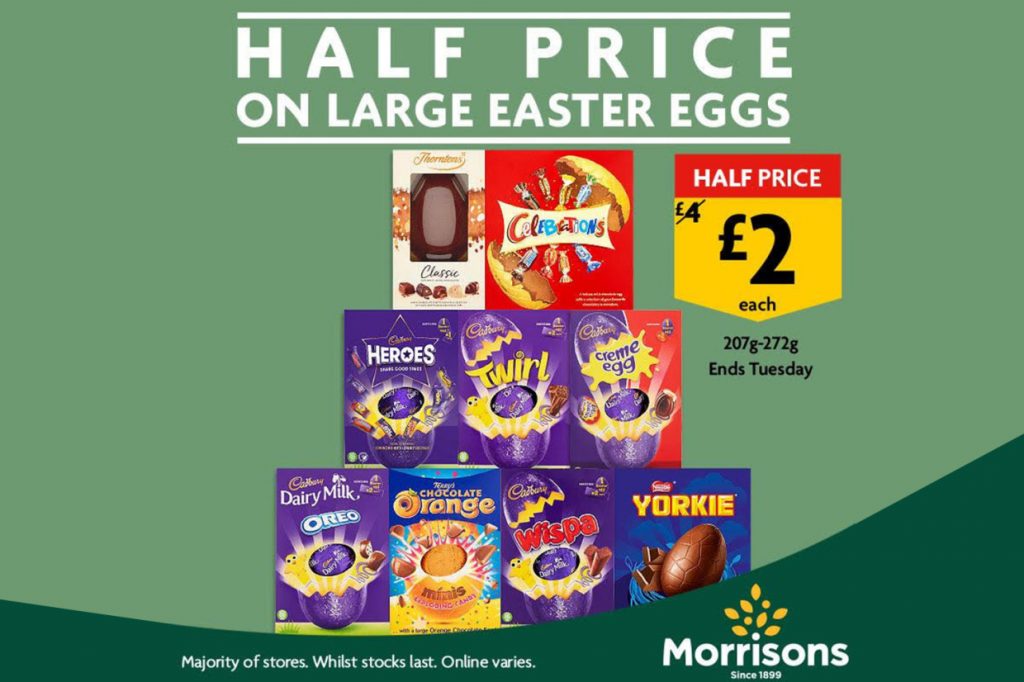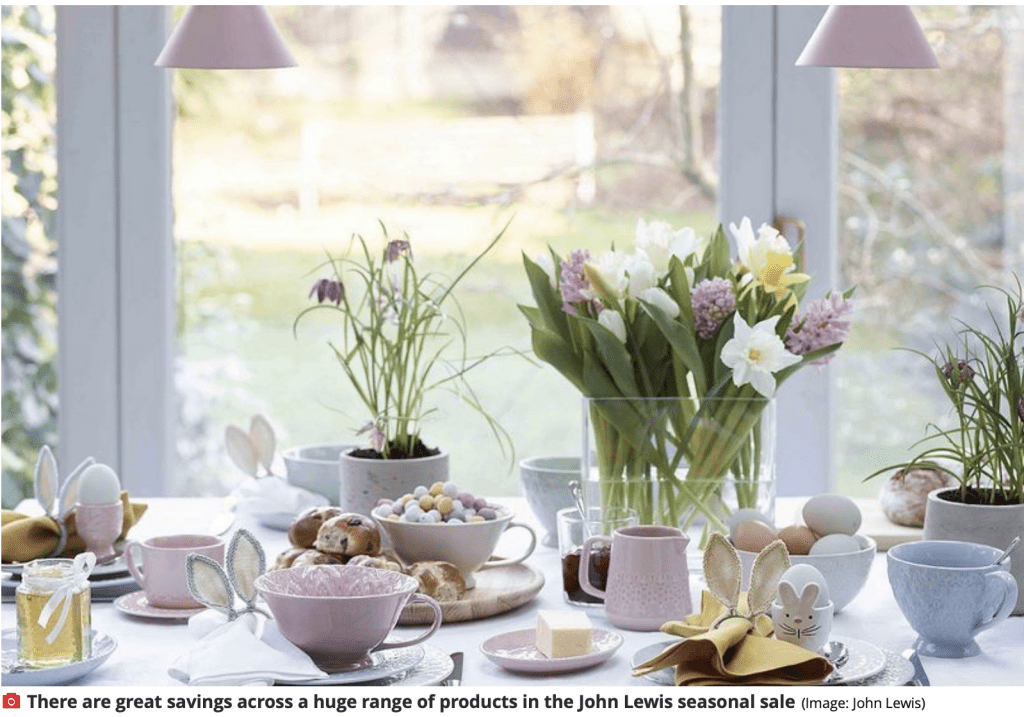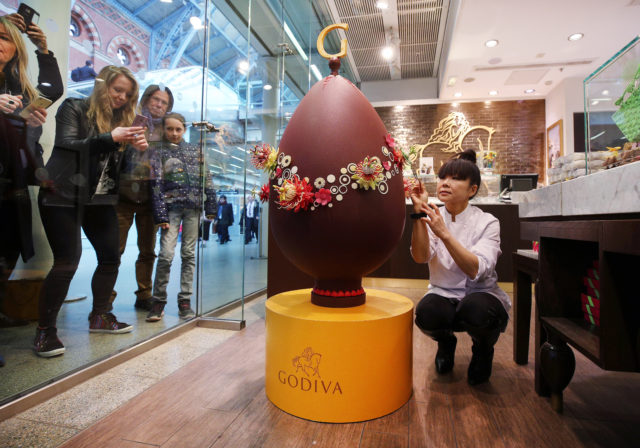In this report, we outline the prospects for retail spending for Easter. Our principal figures regard spending for the holiday, not spending over the four-day holiday weekend, the length of which represents a secondary gain for retailers. We also feature highlights from our recent store checks to see what Easter items retailers are promoting this year.
What Do Consumers Spend on for the Easter Holiday?
According to marketing agency Get Savvy, British consumers spent around £775 million on Easter-related products last year. Our analysis of data from the Office for National Statistics (ONS) suggests that the Easter holiday is worth approximately half a billion pounds to the UK food retail sector alone. In terms of footfall, the busiest shopping day for the holiday is Good Friday, according to retail intelligence agency Springboard.
Approximately 80 million chocolate Easter eggs will be sold in the UK alone with 180 million in the US, this year, and the average child will consume eight chocolate eggs, according to Statista. Kantar Worldpanel estimates that UK chocolate egg and related Easter confectionery sales will total approximately £200 million.
Shopper participation at Easter is higher than for other spring events. A consumer survey last year conducted by Savvy found that 79% of UK shoppers planned to buy Easter eggs, while 28% planned to buy food for a roast dinner and 18% planned to buy an Easter cake.
Approximately 57% of people will take time off work over Easter and 51% will visit relatives, generating £1.2 billion in domestic tourism spending over the holiday, according to national tourism agencies. With Easter falling in April, the weather over the holiday weekend will likely be cooler, which tends to be less likely to boost domestic tourist spending.
Easter is also a peak trading period for home and DIY retailers, as it coincides with many consumers getting started on their gardens and beginning to entertain outside. Increased spending in these categories is due to the start of the spring season and the fact that shoppers have a four-day holiday over which to shop—such spending does not fall into our Easter-specific estimates noted above.
This year, many families are likely to purchase food and beverages, cards and flowers at one of two fast-growing discounters. According to Kantar Worldpanel, these retailers grew their sales by 14%–15% in the 12 weeks ending with March (latest available results). When we visited stores, Aldi was promoting hot cross buns, wines and Easter cakes, while Lidl was featuring deals on flowers, decorations, lamb roasts, and chocolate eggs and bunnies.
Prospects for Retailers
As noted, the sales figures above are for spending for Easter, but retailers also gain from the holiday weekend stretching to four days. Total retail sales increased by a solid 4.7% year over year in February, according to the latest available data from the ONS. Grocery retailers’ sales increased by 2.3% year over year in February.
Although these figures indicate that Easter sales will be strong, it is important to note that consumers are grappling with inflationary pressures, particularly food price inflation, which could soften spending on discretionary categories.
Grocery Retailers
Price and product choice are essential selling points for Easter grocery shoppers and, two weeks ahead of Easter, grocery retailers were offering multiple discounts and specials. The majority of grocers are focusing on promoting chocolate Easter eggs and bunnies, and many are featuring roast dinner ingredients, wines, dessert cakes and hot cross buns. Some of the grocers we visited are also pushing flowers and seasonal decorations, but few are heavily promoting any other nonfood categories. Not surprisingly, discount retailers, Aldi and Lidl offered the lowest prices for Easter lunch goods, according to Good Housekeeping, followed by Morrisons, Tesco, Asda and Sainsbury’s.
Aldi’s featured Easter promotions include roast meats, vegetables and hot cross buns: deals include pork leg for £3.29 per kg, cheesecakes for £2.99 and four hot cross buns for 99p. The retailer’s chocolate Easter egg push focuses on a premium product for £7.99, while big-brand medium-sized eggs are 99p and larger eggs are priced at £2.49.
The price points at Lidl are low: private-label chocolate eggs are offered at two for £6. Other sales include items for roast meals (leg of lamb for £3.99 per kg and all roast vegetables for 29p/kg) and wine (bottles under £5).
Morrisons’ discounts focus mainly on chocolate eggs: single eggs range in price from £1 to £4, and shoppers can buy three for £10. Special offers are also available for Easter vegetables and beef joints.

Tesco is featuring fresh spring flowers and large chocolate eggs at the front of the store and the ends of the aisles. The grocer is offering very low price points on food items: medium chocolate eggs range from £1.50 to £4, and three can be had for £10. Tesco is also offering a variety of deals on smaller chocolate bunnies (including three for £1). Other Easter offerings include cakes, hot cross buns and nonfood items such as plates, Easter decorations and bunny toys.
Waitrose is featuring two branded chocolate eggs for £10 and a Waitrose private-label egg for £4. The retailer is also promoting flowers and roast dinner ingredients.

Marks & Spencer is focusing on nonfood products, such as flowers, decorations and champagne. In its food halls, the retailer is featuring eggs, hot cross buns and roast dinner ingredients, which are available for sampling in the Tasting Kitchen. A variety of Easter eggs and confections are featured, with an average price point of £12
Nonfood Retailers
John Lewis is promoting decorative Easter items, including toy rabbits, Easter baskets and egg wreaths. The store features a variety of mass-market and premium-priced chocolates, but in-store marketing seems particularly focused on nonfood homeware products.

Selfridges and Harrods are emphasizing products made by high-quality chocolatiers. Both retailers have extravagant displays and personalized Easter gift boxes ranging from £25 to £1,000. Compared with the other stores we visited, these two retailers are giving little focus to non-chocolate items.

Key Takeaways
- The late date of Easter this year should boost spending on categories such as DIY and gardening over the four-day holiday weekend.





